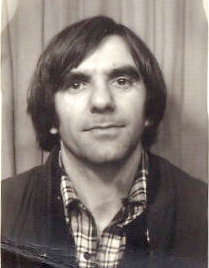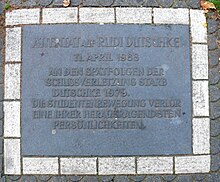
Information to change the world | |
Find Topics, Titles, Names related to your query |

Information to change the world | |
Find Topics, Titles, Names related to your query |
|
|
Rudi Dutschke
|
||||||||||||||||||||||||||
| Rudi Dutschke | |
|---|---|
 |
|
| Born | Alfred Willi Rudi Dutschke March 7, 1940 Schnefeld, German Reich |
| Died | December 24, 1979 (aged 39) rhus, Denmark |
| Cause of death | drowned because of epileptic seizure while in the bathtub |
| Residence | Berlin, Germany |
| Nationality | German |
| Known for | Spokesperson of the German student movement |
| Home town | Luckenwalde, East Germany |
| Spouse(s) | Gretchen Klotz (1966–1979) |
| Children | 3 |
Rudi Dutschke born Alfred Willi Rudi Dutschke (March 7, 1940 – December 24, 1979) was the most prominent spokesperson of the German student movement of the 1960s. He advocated 'a long march through the institutions' of power to create radical change from within government and society by becoming an integral part of the machinery.[1] This was an idea he took up from Antonio Gramsci and the Frankfurt school of Cultural Marxism.[2] In the 1970s he followed through on this idea by joining the nascent Green movement.
In 1968, he survived an assassination attempt committed by Josef Bachmann, living for another 12 years until related health problems caused his death. Radical students blamed an anti-student campaign in the papers of the Axel Springer publishing empire for the assassination attempt. This led to attempts to blockade the distribution of Springer newspapers all over Germany, which in turn led to major street battles in many German cities.[3]
Contents |
Dutschke was born in Schnefeld, (Dahme-Spreewald, Brandenburg), in the German Reich. He attended school in and graduated from the Gymnasium there, but because he refused to join the army of the German Democratic Republic (East Germany) and convinced many of his fellow students to refuse as well, he was prevented from attending university in the GDR. He fled to West Berlin in August 1961, just one day before the Berlin Wall was built. He studied sociology at the Free University of Berlin under Richard Lwenthal and Klaus Meschkat where he became acquainted with alternative views of Marxism.
Dutschke joined the German SDS Sozialistischer Deutscher Studentenbund (which was not the same as the SDS in the USA, but quite similar in goals) in 1965 and from that time on the SDS became the center of the student movement, growing very rapidly and organizing demonstrations against the war in Vietnam.
He married the American Gretchen Klotz (de) in 1966. They had three children. Dutschke's third child, 1980-born Rudi-Marek Dutschke (often known as just Marek Dutschke) was born after his father's death. He is a politician of the German Green Party[4] as well as Dean's Office staffer of the Hertie School of Governance[5] today. His older siblings are Hosea-Che Dutschke (named after the Old Testament minor prophet Hosea and Che Guevara) and their sister Polly-Nicole, both born in 1968.
Influenced by critical theory, Rosa Luxemburg and critical Marxists, Dutschke developed a theory and code of practice of social change via the practice of developing democracy in the process of revolutionizing society.
Dutschke also advocated that the transformation of Western societies should go hand in hand with Third World liberation movements and with democratization in communist countries of Central and Eastern Europe. His socialism had strongly Christian roots; He called Jesus Christ the "greatest revolutionary", and in Easter 1963, he wrote that "Jesus is risen. The decisive revolution in world history has happened - a revolution of all-conquering love. If people would fully receive this revealed love into their own existence, into the reality of the 'now', then the logic of insanity could no longer continue."[6]
Benno Ohnesorg's death in 1967 at the hands of German police pushed some in the student movement toward increasingly extremist violence and the formation of the Red Army Faction. The violence against Dutschke further radicalised parts of the student movement into committing several bombings and murders. Dutschke rejected this direction and feared that it would harm or cause the dissolution of the student movement. Instead he advocated a 'long march through the institutions' of power to create radical change from within government and society by becoming an integral part of the machinery.[1]

On April 11, 1968, Dutschke was shot in the head by Josef Bachmann. After the attempted assassination, Dutschke and his family went to the United Kingdom in the hope that he could recuperate there. He was accepted at Cambridge University to finish his degree in 1969, but in 1971 the Tory government under Edward Heath expelled him and his family as an "undesirable alien" who had engaged in "subversive activity", causing a political storm in London. They then moved to rhus, Denmark, after professor Johannes Slk had offered him a job at the University of Aarhus which made it possible for Dutschke to gain a Danish residence permit.
Dutschke reentered the German political scene after protests against the building of nuclear power plants activated a new movement in the mid-1970s. He also began working with dissidents opposing the Communist governments in East Germany, Poland, Yugoslavia, Hungary, and Czechoslovakia, including Robert Havemann, Wolf Biermann, Mihailo Petkovic, Milan Hor¡äek, Adam Michnik, Ota Åik and more.
Because of massive brain damage from the assassination attempt, Rudi Dutschke continued to suffer health problems. He died on 24 December 1979 in rhus, Denmark. He had an epileptic seizure while in the bathtub and drowned.[citation needed]
The song "Rot" by Markus Henrik features a mention of Dutschke, who can also be seen in the music video of the same. The song uses Dutschke as a reminder of political activism in Germany in the 60s and 70s.
There's also a [7] Finnish song about Rudi Dutschke, by Eero Ojanen. It's based on lyrics by Wolf Biermann.
The song Drei Kugeln auf Rudi Dutschke by Wolf Biermann.
Dutschke appears as Prussian nobleman-turned anarchist Count Rudolf von Dutschke in the novel Warlord of the Air, the first part of Michael Moorcock's alternate history/steampunk trilogy A Nomad of the Time Streams. Revolutionary socialist Count von Dutschke is close friends with a very aged Vladimir Ilyich Ulyanov (whom he fondly relates to as "Uncle Vladimir") in Moorcock's alternate 1973 where the October Revolution never took place. In Harry Mulisch's novel The Discovery of Heaven Dutschke makes a cameo appearance at a "political and musical happening" in a chapter titled "The Demons."
Was portrayed by Sebastian Blomberg in the 2008 film Der Baader Meinhof Komplex.
| Wikimedia Commons has media related to: Rudi Dutschke |
Related topics in the Connexions Subject Index
Alternatives –
Left History –
Libraries & Archives –
Social Change –
This article is based on one or more articles in Wikipedia, with modifications and additional content contributed by
Connexions editors. This article, and any information from Wikipedia, is covered by a
Creative Commons Attribution-Sharealike 3.0 Unported License (CC-BY-SA) and the
GNU Free Documentation
License (GFDL).
We welcome your help in improving and expanding the content of Connexipedia articles, and in correcting errors. Connexipedia is not a wiki: please contact Connexions by email if you wish to contribute. We are also looking for contributors interested in writing articles on topics, persons, events and organizations related to social justice and the history of social change movements.
For more information contact Connexions



